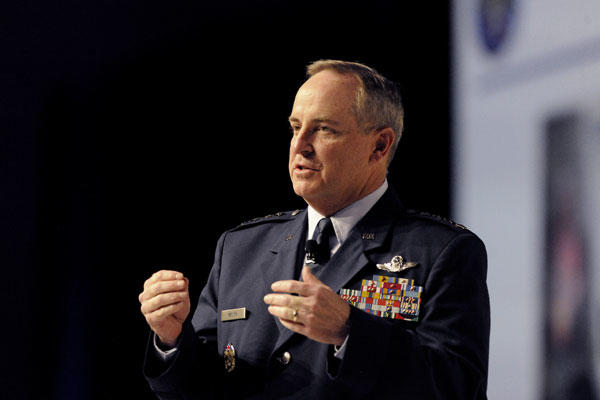The U.S. Air Force's top officer pushed back against a lawmaker's proposal to curb military sexual assault, saying the service found just one case in three years in which a commander disagreed with a recommendation for prosecution.
After a spate of sex-related incidents last year, the Air Force reviewed all courts-martial from the previous three years -- more than 2,400 cases -- and found 25 instances in which a commander disagreed with a judge advocate general's recommendation to prosecute the case in a court-martial, Air Force Chief of Staff Gen. Mark Welsh said.
In more than half of those, a higher-level commander ended up siding with the JAG and restoring the original recommendation, he said.
"So in 12 of those 2,411 cases, which is a pretty small percentage -- about 0.5 percent, actually -- we did not have agreement between the commander and the JAG on the best way forward," Welsh said during a breakfast Wednesday at the National Press Club in Washington, D.C. "One of those was a sexual-related case."
It wasn't clear whether Welsh was referring to the high-profile case handled by Lt. Gen. Craig Franklin, the former commander of the 3rd Air Force at Ramstein Air Base in Germany, who last year overturned a sexual assault conviction of a fellow officer and fighter pilot, Lt. Col. James Wilkerson III. The decision became a flashpoint of criticism over the military's handling of sexual assault and Franklin ended up retiring this year partly because of the controversy.
A spokesman for the general couldn't immediately say how many times a commander has overturned a verdict from a court-martial.
Welsh acknowledged that commanders aren't "fully prepared" to deal with every aspect of sexual assault cases, but noted that each is advised by a trained prosecutor. He also made clear that he disagrees on the issue with Sen. Kirsten Gillibrand, D-N.Y., who has unsuccessfully pushed legislation to strip commanders' of their authority to prosecute such crimes.
"The idea that the commanders aren't trained and therefore ... don't take the right action is an interesting discussion, but it's not true," Welsh said after citing the courts-martial figures. "It doesn't happen. It just doesn't happen. And so that logic doesn't track well with me."
When asked for comment, a spokesman for Sen. Gillibrand's office said she is still waiting for the Defense Department to respond to her request for more information about how the military investigated and adjudicated sexual assaults at major military installations over the past five years.
"2 ½ months later…still waiting for Pentagon transparency," Gillibrand tweeted yesterday.
Gillibrand's bill, which was narrowly defeated last month in the Senate by a vote of 55-45 -- just shy of the 60 votes needed to overcome a filibuster -- would have given military lawyers the authority to prosecute sex assaults and other crimes rather than commanders. Gillibrand argued that such a move was necessary because many victims are reluctant to come forward for fear of reprisal from the chain of command.
An estimated 26,000 active-duty troops had unwanted sexual contact in fiscal 2012, up from about 19,300 in 2010, according to a 2013 report from the Pentagon. By comparison, 3,374 troops reported sexual assaults in 2012, an increase of 5.7 percent from the previous year, according to the report.
(Story was updated to add quotes from the senator's office beginning in the ninth paragraph and to clarify that Welsh wasn't referring to cases in which a commander disagreed with a verdict.)
-- Brendan McGarry can be reached at brendan.mcgarry@monster.com



























